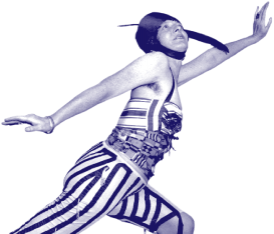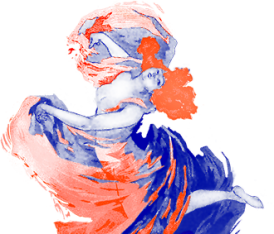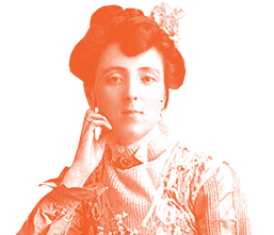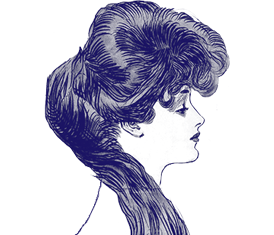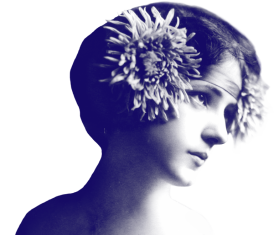HomeNews & Events2014May Emma Doran Defends her Doctoral...
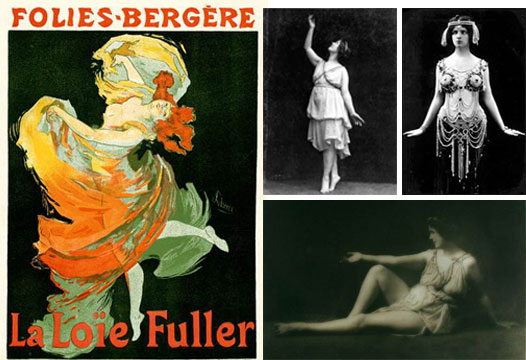
On Monday, May 5, Communication and Culture doctoral student Emma Doran defended her doctoral dissertation, "'Feeling' in Modern Dance Print Media: Loie Fuller, Isadora Duncan, Maud Allan." The defense was rigorous and energizing, as Emma impressed the committee with her knowledge, poise and preparedness.
Emma shone the light on the emergence of the modern dance review, exploring a protean body of dance print media writings during the early twentieth century. As a dancer, dance reviewer, and communication and culture scholar, Emma eloquently reflected on her own positionality in tackling this topic. In examining how dance is translated into language in these nascent reviews, Emma was drawn to the dance writers' limitations of language, the materiality of language itself, and the process the critic undergoes.
The dissertation opened with the curation of twenty-five images from photographs, paintings, and posters of the three dancers collected by Emma Doran, who talked about her work at the Danse Collection Dance in Toronto, where she first encountered the work of Canadian-born dancer Maud Allan.
The dissertation was supervised by Dr. Irene Gammel, who noted that she was impressed with Emma Doran's "ambition, her outstanding grasp of theory, and her ability to establish connections among different fields, such as dance and performance studies, phenomenology, and print-media studies. Equally impressive was the archival body of work generated by Emma."
Dr. Carol Simpson Stern, who teaches at the School of Communication, and is associate editor of Text and Performance Quarterly (Routledge), served as the external examiner. She summed up her impressions by noting: "Conceptually, this is an ambitious, well-argued thesis, fully conversant with current critical theory in the fields of dance criticism, theatre, performance studies and communication, and cognizant of the body of writing in cultural studies that proves useful to her inquiry into journalistic practices and the reception of the works of these dancers."
As for Emma's immediate plans, she looks forward to graduating in June, an event that will be attended by her parents, to whom her dissertation is dedicated. Emma also hopes to focus on translating the dissertation for publication.
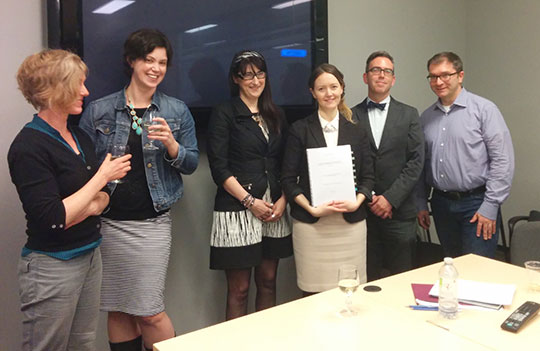
The dissertation committee included (L-R): Dr. Kym Maclaren (Philosophy, Ryerson), Dr. Marlis Schweitzer (Theatre/Performance Studies, York University), Dr. Irene Gammel (English, Ryerson; supervisor), Emma Doran (candidate), Dr. Jason Boyd (English, Ryerson; committee chair), Dr. Paul Moore (Sociology and Graduate Director, Communication and Culture, Ryerson). Also part of the committee was Dr. Danielle Robinson (Dance, York University) who is not seen in the photo.
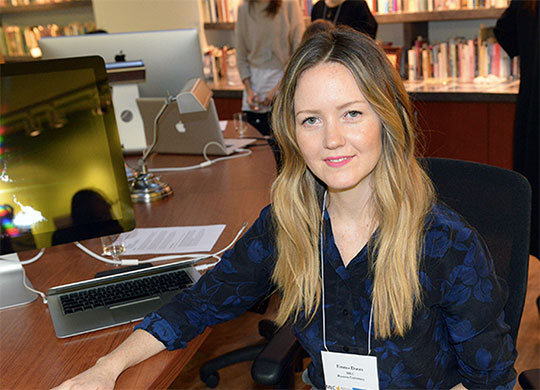
Emma at her desk at the Modern Literature and Culture Research Centre
An MLC Interview with Emma Doran (May 2014)
This dissertation was supported by the Communication and Culture Programme, the Yeates School of Graduate Studie, and by the Modern Literature and Culture Research Centre, via the Canada Research Chairs Program in the Faculty of Arts, which provided funds for the research of archival images, as well as partial funds for conference travel, and office space for the preparation of the dissertation.








